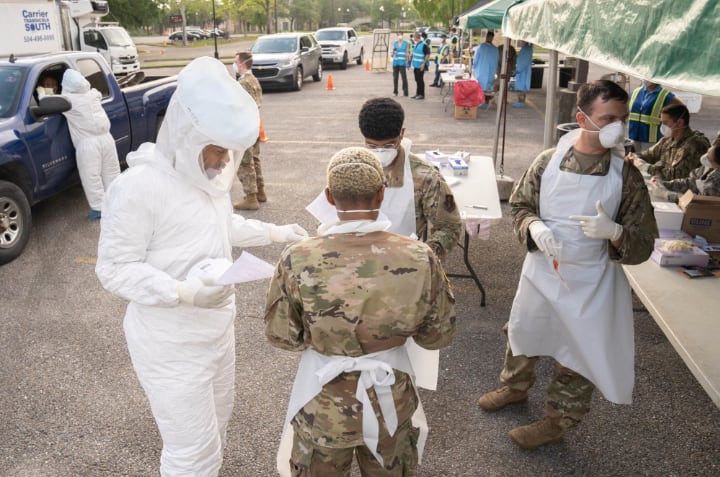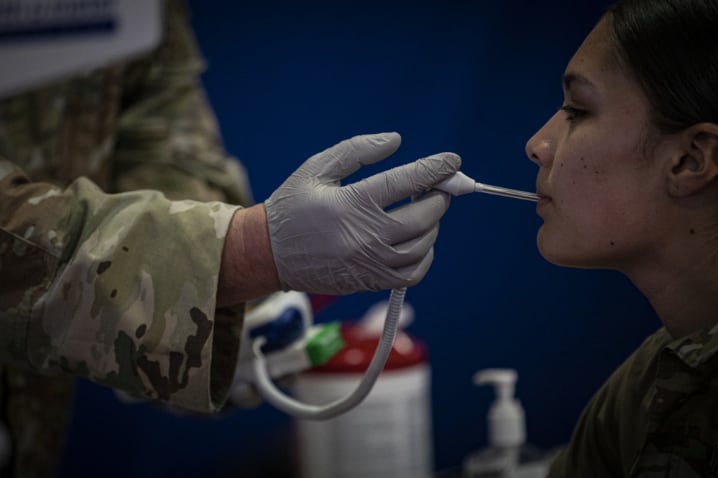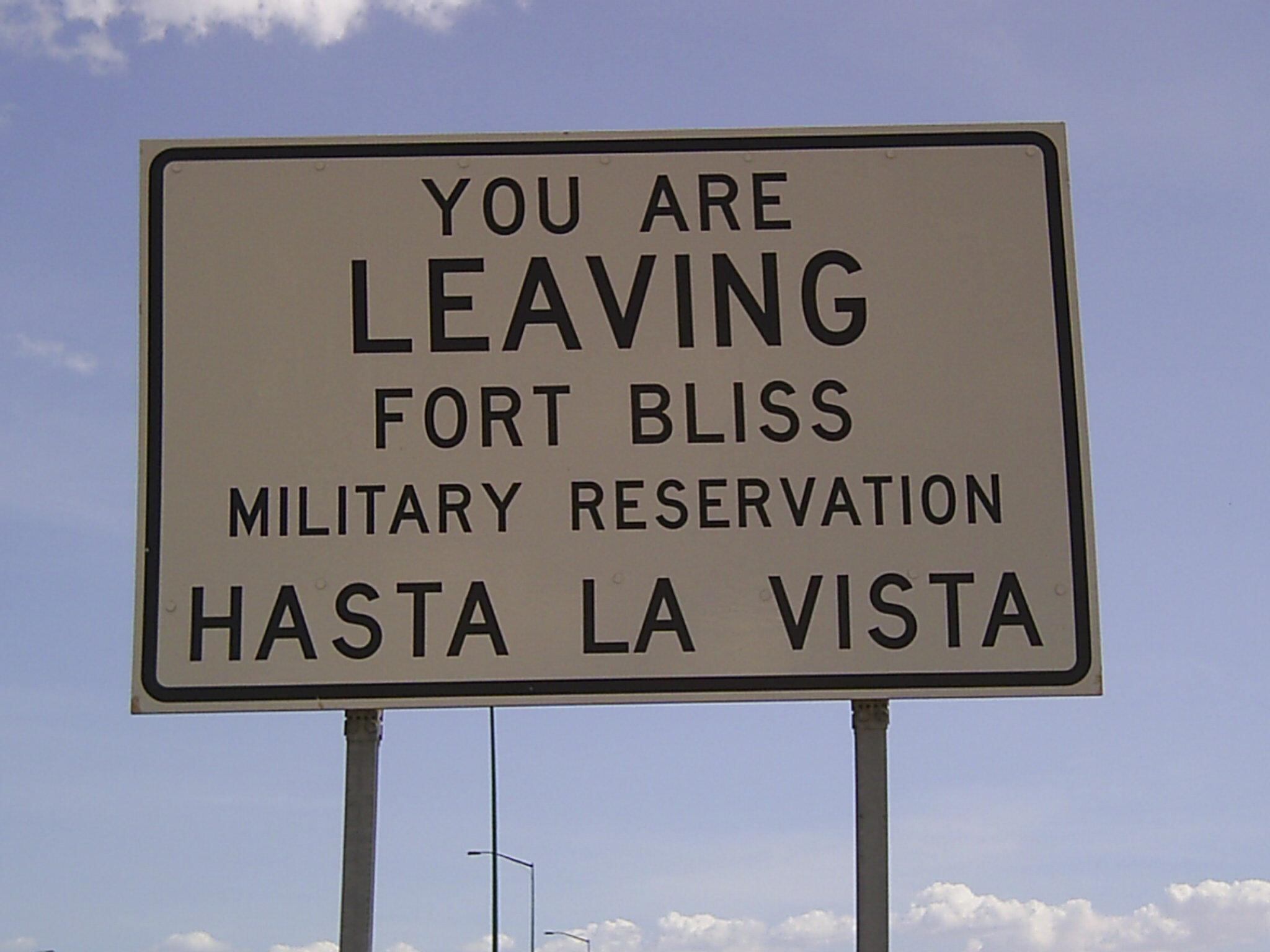Slightly ahead of Big Army guidance, some of the service’s bases began to scale back work requirements and move to mission-essential manning this week, as the number of coronavirus cases leaped among the military population at large.
Acting senior commander of 1st Armored Division and Fort Bliss, Col. Matthew Eichburg, spoke with Army Times on Tuesday about his own decision to move to mission-essential manning. Hours later, Army headquarters put out new health protection guidance that orders all installations to similarly limit access to essential personnel and cut down on the number of access points.
Initially, public health officials were concerned people would bring the virus to their home communities after traveling from places like Italy. In the last couple of days, Eichburg’s hospital advisers warned him that “community spread” may be occurring in El Paso, meaning that for each individual they couldn’t always track how and where the virus was contracted.
“If you’re associated with a particular mission, then of course, we’ll come in and we’ll execute,” Eichburg said over the telephone. “If you’re not, then you’ll go home and the chain of command will maintain communication with their soldiers.”
At Fort Bliss, essential missions still include those done by the 5th Armored Brigade, which trains western-based Army reserve and National Guard units for upcoming combat deployments, as well as those helping with the quarantine.
“If [you’re] a young soldier off-post, the squad leader is communicating with that soldier every day to make sure he and his family are okay, he doesn’t need anything, he’s healthy, if he needs an exception to policy for something, he gets it, etc.," Eichburg added.
One soldier working in headquarters battalion said Wednesday morning that mission-essential manning was instituted at his level. He said troops are told to telework and be productive by taking online classes, not drink during the duty day and conduct text-based accountability twice per day at a minimum.
“We had a range planned for today — but once they announced base-wide HPCON C, they told us it was all cancelled,” the soldier told Army Times.
The Army ordered all bases to move to HPCON Charlie Tuesday evening. But some installations, like Fort Bliss, were already adjusting policies.
New York’s Fort Drum announced mission-essential manning on Tuesday evening, as well. The commander there, Maj. Gen. Brian J. Mennes, ordered troops to conduct individual physical training as appropriate and to telework when possible while at the same time to not hold formations and to no longer train on ranges.
Fort Bragg in North Carolina has already been following many of the HPCON Charlie guidelines. One paratrooper there told Army Times that the measures were still mixed as of Tuesday. While the number of people on base has dropped and some facilities closed, the paratrooper said walking around his battalion revealed that about half the unit was still there from 9 a.m. to 3 p.m.
“Some command teams are trying to get their guys out, but they end up getting called back in for some random detail that [battalion] needs,” the paratrooper added.
A different soldier at Fort Bragg said he has seen the measures largely pan out as of Wednesday. Everyone below the battalion commander and sergeant major are working from home, said the soldier, who works in an intelligence unit.
Fort Wainwright in Alaska’s interior has gotten better, according to a senior non-commissioned officer on post. Soldiers began implementing more stringent manning policies last week, but that resulted in some units sending troops home, while others did not.

“What every unit thinks is mission essential is different,” said the Alaska-based soldier. He added that things changed over the past day, with many soldiers being told to just stay in uniform during the duty day and remain on call, while staff personnel continued to report.
“As of like Monday, even Tuesday, I don’t think people here took it serious. People were still gathering in meetings, shaking hands,” the soldier said. “With this new stuff that came out last night I hope people will.”
At the Presidio of Monterey, California, a soldier studying at the Defense Language Institute said students are now taking classes remotely. They complained, however, that afternoon physical training remained in place, and even grew recently to include Fridays at their company.
“They try to break us up into groups of ten," the soldier said. "But we’re still moving in the same spots, like we’re still exposing ourselves to each other.”
An hour after that individual spoke with Army Times, group PT was officially cancelled and soldiers were told to exercise individually. “They must have finally been told to knock it off,” the soldier noted in a text message.
Fort Bliss is still in the process of bringing its 3rd Brigade in from field training, which started Sunday. Soldiers across the Army at various ranks have complained to Army Times about the push to continue training through the pandemic.
Starting Tuesday, though, the 1st Armored Division implemented tighter coronavirus prevention measures. A lot of essential services, like the commissary and some out-processing facilities, will remain open but with “extreme social distancing,” according to Eichburg. The move brings the post in “lock-step” with the surrounding community of El Paso, he added.
“When we hesitated, we were doing training,” said Eichburg, adding that he has remained engaged with his health care advisers for input. "Over the last couple of days, those professionals became more and more concerned about the potential spread in El Paso.”
There have only been four confirmed coronavirus cases on Fort Bliss so far, all belonging to Army reservists from New York who were training there.
“We’re continuing to monitor the other 16 [reservists],” Eichburg said. “What we learned was, the first soldier who was identified as COVID positive, she came from New York, but she had traveled to Washington and then she went back to New York. Then they came here. We don’t know where she contracted it. We just know she became symptomatic here.”

A viral tracing team determined that only the New York reservists needed to be quarantined.
Many Army units have said that soldiers in the field were likely at less risk of infection due to the environment’s isolation. At Fort Bliss, soldiers told Army Times previously that people were “coming and going” between the field and post during training, which could spread the virus.
Fort Bliss has roughly 1,300 soldiers in quarantine as of Tuesday. That includes elements of 2nd Brigade, which recently returned from Poland and Germany. Unlike some other posts, Fort Bliss is not allowing those with homes off-post to quarantine there in an effort to limit transmission to families and the El Paso community.
“We have one standard. I’m not going to treat a senior leader with a family different than I would a private who lives in the barracks," Eichburg said, noting that doing so will also keep the chain of command intact while in quarantine.
Eichburg called many of the early complaints about quarantine conditions “legitimate.” The first rounds of soldiers entering quarantine had no idea they would be placed under restrictions due to the outbreak.
Post officials across the Army, like government administrators everywhere, appeared largely caught off-guard by the pandemic.
“The first couple of days were difficult,” Eichburg said. “The food was not up to standard and they were not getting enough time outside — very valid complaints. They got there on a Saturday and by Monday those things were being fixed and addressed.”
A Fort Bliss soldier Army Times spoke with who has friends recently returned from Europe said that the quarantine area “has significantly improved” since the news first broke about its poor quality.
Kyle Rempfer was an editor and reporter who has covered combat operations, criminal cases, foreign military assistance and training accidents. Before entering journalism, Kyle served in U.S. Air Force Special Tactics and deployed in 2014 to Paktika Province, Afghanistan, and Baghdad, Iraq.




